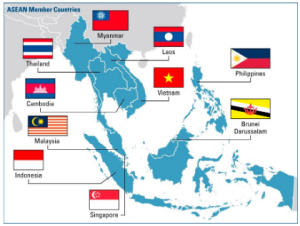Context:
Recently, the Prime Minister attended the 20th ASEAN-India Summit and the 18th East Asia Summit (EAS) in Jakarta, Indonesia.
Highlights of 20th ASEAN-India Summit: Theme: ‘ASEAN Matters: Epicentrum of Growth’
Prime Minister of India presented a 12-point proposal to bolster India-ASEAN cooperation:
- Multi-modal connectivity and economic corridor that links South-East Asia-India-West Asia-Europe.
- Sharing India’s Digital Public Infrastructure Stack with ASEAN partners.
- Announced ASEAN-India fund for Digital Future
- Announced renewal of support to the Economic and Research Institute of ASEAN and East Asia (ERIA).
- Raising issues being faced by Global South in multilateral fora.
- Invited ASEAN countries to join the Global Centre for Traditional Medicine.
- Working together on Mission LiFE.
- Sharing India’s experience in providing affordable medicines to people through Jan-Aushadhi Kendras.
- Collective fight against terrorism, terror financing and cyber-disinformation.
- Invited ASEAN countries to join the Coalition for Disaster Resilient Infrastructure.
- Cooperation in disaster management.
- Enhanced cooperation on maritime safety, security and domain awareness.
|
- PM emphasized alignment between India’s Indo-Pacific Ocean’s Initiative (IPOI) and ASEAN’s Outlook on the Indo-Pacific (AOIP), highlighting regional strategy convergence.
- The PM urged a swift review of the ASEAN-India Free Trade Agreement (AITIGA) for enhanced trade and economic cooperation.
- India and ASEAN committed to bolstering maritime cooperation, focusing on safety, sustainable Blue Economy, connectivity, innovation, and eco-tourism.
- The Prime Minister announced a new embassy in Timor-Leste, an ASEAN observer.
Highlights of the 18th East-Asia Summit: At the East-Asia Summit, PM conveyed several key points:
- Emphasized a free and open Indo-Pacific, implying China, for regional stability.
- Supported ASEAN centrality, advocated a rules-based Indo-Pacific.
- Called for cooperation on global issues like terrorism, climate change, resilient supply chains (food, medicine), and energy security.
- Highlighted India’s climate efforts: ISA, CDRI, LiFE, OSOWOG.
India’s Relationship with ASEAN:
- Central to Act East Policy: Originally conceived as an economic initiative, this policy has expanded to encompass political, strategic, and cultural dimensions.
- ASEAN Plus Six: India is part of the ASEAN Plus Six grouping, which includes ASEAN member states along with China, Japan, South Korea, New Zealand, and Australia.
 This forum provides a platform for dialogue, cooperation, and collaboration on various regional and global issues.
This forum provides a platform for dialogue, cooperation, and collaboration on various regional and global issues.
- Economic Significance: Collectively, they contribute to 7% of the world’s GDP and represent 26% of the global population, highlighting their substantial combined strength.
- In 2010, India and ASEAN signed a Free Trade Agreement (FTA). This led to an increase in trade and economic cooperation.
- The bilateral trade increased from US$ 9 billion (2002) to US$ 150 billion (2023).
- Defense Ties: The 1st ASEAN-India Maritime Exercise took place in May 2023, marking a significant achievement.
- India and Singapore naval cooperation and logistic exchange agreement.
Challenges in India-ASEAN Relations:
- Strategic Competition: The strategic competition between the United States and China in the Asia-Pacific region poses a significant challenge for ASEAN.
- Lack of Strong and Committed Leadership: A dearth of strong and committed leaders who can effectively address the diverse range of challenges within the region.
- Unlike the European Union (EU), ASEAN lacks a centralized custodian or authority responsible for overseeing and coordinating the affairs of the 10-nation bloc.
- Connectivity Issues: Despite initiatives like the India-Myanmar-Thailand Trilateral Highway and the Kaladan Multimodal Transit Transport Project, connectivity challenges in the region persist. Delays in infrastructure development can hinder trade and cooperation.
- Territorial Disputes: Territorial disputes in the South China Sea, involving some ASEAN members and China, can complicate regional security and stability.
- Economic Challenges:
- Regional Comprehensive Economic Partnership (RCEP): India decided not to join the RCEP in 2020 due to concerns about its potential impact on domestic industries.
- Imbalance Trade: India’s exports to ASEAN increased to US$ 44 billion from US$ 42.32 billion in 2021-22. However, imports jumped to US$ 87.57 billion compared to US$ 68 billion in 2021-22.
- Fragmented Markets: ASEAN is not a single market, posing challenges for Indian businesses seeking streamlined trade.
- Reciprocal Trade and Investment Barriers: ASEAN faces trade and investment barriers in India, such as concerns regarding India’s CAROTAR rules imposed in 2020.
Way Forward:
- AITIGA Review: Efforts to conclude the ASEAN-India Free Trade Agreement (AITIGA) review may intensify, particularly in promising sectors like pharmaceuticals, health, cyber, financial, and maritime security domains.
- Collaborative Initiatives: India’s International Solar Alliance (ISA) and Coalition for Disaster Resilient Infrastructure (CDRI) could provide solutions to ASEAN’s challenges.
- Enhanced Partnership: Deepen the Comprehensive Strategic Partnership established in 2022, focusing on diverse sectors such as connectivity, maritime cooperation, digital transformation, trade, and the economy.
- Digital Transformation: Promote digital transformation, including digital connectivity and technology sharing.
- Integration of ASEAN Studies: Courses on ASEAN studies should be integrated into school curricula, spanning from primary school to university level.
News Source: Ministry of External Affairs
![]() 9 Sep 2023
9 Sep 2023
 This forum provides a platform for dialogue, cooperation, and collaboration on various regional and global issues.
This forum provides a platform for dialogue, cooperation, and collaboration on various regional and global issues.